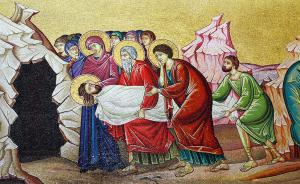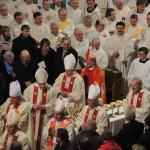
Jesus came to bring everyone life; he did not come to judge and condemn us to death (cf. Jn. 12:47). It is the thief, he said, who comes to kill and steal, while he came to help us have an abundant life “I am the door; if any one enters by me, he will be saved, and will go in and out and find pasture. The thief comes only to steal and kill and destroy; I came that they may have life, and have it abundantly”(Jn. 10:9-10 RSV). He loves everyone, wanting what is best for us all. For this reason he came, not only to guide us with his wisdom, but to lay down his life; he did all he could to protect us from all anything which would lead us to our own death and destruction. “I am the good shepherd. The good shepherd lays down his life for the sheep”(Jn. 10:11 RSV). Why, then, do so many of us, despite hearing this, act contrary to Christ and go out into the world in order to find people to judge and condemn? Why do we promote death and destruction instead of the Gospel with its teaching concerning the dignity and value of all life?
If we want to follow Christ, we must do what he did, which is bring mercy and grace into the world. Instead of exposing the apparent sins of others, judging and condemning them, we would, as St. Gregory Palamas said, seek to cover up their offenses, imitating Noah’s good sons instead of Ham:
‘You shall not accuse anyone falsely’ (cf. Exod. 20 : 16), lest you become like the devil, who falsely accused God to Eve and so was cursed by God (cf. Gen. 3: 14). Rather, you should conceal your neighbour’s offence, unless by doing so others may be injured; and in this way you will imitate not Ham, but Shem and Japheth, and so like them receive the blessing (cf. Gen. 9: 25-7).[1]
We have a high priest, Jesus, who has sanctified the world by laying down his life for it. He sacrificed himself so that we could live. He covers up the wounds of our sins, as well as the way others have harmed us, with the healing balm of grace so that we could recover and be made whole. Without his aid, we would have found ourselves to be spiritually paralyzed by our sins, but with his advent and sacrifice, we now find ourselves free to move as our sins have been forgiven. This, it would seem, is the spiritual interpretation we are meant to have of the Gospel story in which Christ heals a paralytic:
And they came, bringing to him a paralytic carried by four men. And when they could not get near him because of the crowd, they removed the roof above him; and when they had made an opening, they let down the pallet on which the paralytic lay. And when Jesus saw their faith, he said to the paralytic, “My son, your sins are forgiven” (Mk. 2:3-5 RSV).
Notice, the four men did not condemn the paralytic, but rather, they helped him around until he could be taken to Christ for healing.[2] This shows us how we should deal with others. Instead of increasing their wounds through judgmental abuse, we should do all that is in our power to help heal them, so that they can recover from the paralysis they have as a result of sin and its wounds. We should show them mercy, not judgment, so that they could come to the healing balm of Christ’s forgiveness. Sadly, so many of us ignore the dignity of others, and so look for some excuse to ignore their plight, and when we do so, use that excuse to judge and condemn them. That is, those of u who are judgmental will always find an excuse to ignore the liberating power of Christ and instead force people to remain as they are, just as we read some tried to do with the paralyzed man:
Now some of the scribes were sitting there, questioning in their hearts, “Why does this man speak thus? It is blasphemy! Who can forgive sins but God alone?” And immediately Jesus, perceiving in his spirit that they thus questioned within themselves, said to them, “Why do you question thus in your hearts? Which is easier, to say to the paralytic, `Your sins are forgiven,’ or to say, `Rise, take up your pallet and walk’? But that you may know that the Son of man has authority on earth to forgive sins” — he said to the paralytic — “I say to you, rise, take up your pallet and go home.” And he rose, and immediately took up the pallet and went out before them all; so that they were all amazed and glorified God, saying, “We never saw anything like this!” (Mk. 2:6-12 RSV).
Despite those who were judgmental, despite those who thought Jesus should not forgive sins nor heal those who have become spiritually paralyzed, Jesus showed he had great love and compassion for such sinners. He came so that they could be healed. He wanted to help them overcome the overcome the wounds of sin so that they could get up and walk with the grace which he was willing to give them. He forgave without being asked for forgiveness, showing us that grace is freely given and being spread into the world. We cannot and must not expect sinners, caught in bondage with sin, to be free from sin before receiving that grace themselves.
Everyone is called to Jesus; everyone is called to receive his healing grace. Those who are judgmental will seek to limit who receives that grace, and doing so, risk cutting themselves off from it instead. We have our own sins which have been forgiven, and we should remember that before we look to others and judge them for their sins.
But these people of whom you speak judge because they lack judgment. In their inexperience, they find themselves lacking in what could have been useful to their brothers. Impudently taking to themselves the judgment which belongs to God, they say that one person rather than another is worthy of grace, choosing any basis they like for this judgment. But it is for God alone to designate those who are worthy of His graces. [3]
As God is willing to forgive and heal us from our sins, so God is willing to heal others of their own sins; we must not think that ours are sins are somehow less than theirs, believing that for this reason, we are worthy of grace and they are not. Instead, we must realize the grace of God is for all, and Jesus, the great high priest, sacrificed himself for all of us so that no one needs be left wanting God’s grace.
[1] St. Gregory Palamas, “A New Testament Decalogue,” in The Philokalia: Volume IV. Trans. and ed. G.E. H. Palmer, Philip Sherrard, Kallistos Ware, et. al. (London: Faber and Faber, 1995), 329-30 [#9].
[2] It is easy to see how and why later allegorical interpretations of this text would lead commentators to suggest the four men represented the four Gospel writers of Matthew, Mark, Luke and John, and while it is indeed a possible interpretation to be added to our reading of the passage, its original readers would not have made this connection as they would not have known there would be four such authoritative Gospels,
[3] St. Gregory Palamas: The Triads: Books One. Trans. Robin Amis (Wellington, Somerset: Praxis, 2002), 143.
Stay in touch! Like A Little Bit of Nothing on Facebook.
If you liked what you read, please consider sharing it with your friends and family!













